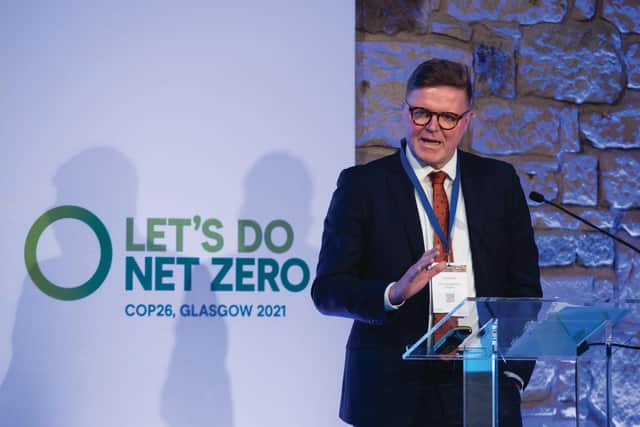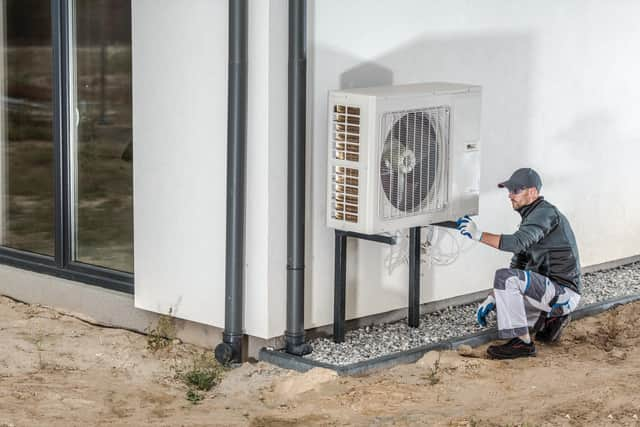Working for net-zero


For Scotland to achieve net-zero, will every future job be a green job? If so, how are green skills being embedded throughout the skills system?
When we talk about green jobs, it’s easy to think about hydrogen engineers or low-emission vehicle technicians. But it’s also about a mindset change across the entire workforce, so that everyone is thinking about minimising carbon footprints as part of their work. For example, anyone involved with staff travel or procurement in an organisation has a part to play.
We’re also putting what we call “green competencies” at the heart of all apprenticeships in Scotland. Whatever you are studying, part of your qualification will need to be about having an understanding of the implications of the transition to net-zero.


The Climate Emergency Skills Action Plan, published in November 2020, promises both immediate and longer-term actions to support the development of the skills needed to meet the climate change challenge. What are those “immediate actions”?
It’s about focusing on the existing technology base, and looking at what’s coming next. It’s about understanding the jobs needed here and now and the transition taking place.
So it’s both existing jobs that we need more of, such as flood engineers and planners, and jobs that will be affected by the transition – heating engineers transitioning away from installing gas boilers; people in the motor vehicle trade learning to work with electric vehicles, and so on.
An urgent focus is supporting people already in the workforce to upskill and reskill. That’s why we have established the Green Jobs Workforce Academy, which mixes online and in-person training to help people understand the training and skills they require to do specific jobs effectively.
Another immediate action has to be focusing on the long term. We have to get public and private sector partners together now to build a coalition to improve awareness of the urgency of the challenge, and spread that message widely. This is a 15-year-plus challenge, but we have to engage now.
How challenging is the constant and rapid pace of change?
Some people will always argue it’s too hard to predict what is coming down the line and say we should leave it to the market to sort things out. I fundamentally disagree.
Yes, it’s a complex challenge and you don’t always know which technologies will win through and need far more workers, but we address that by listening really carefully to business and industry.
We need to focus on areas where we have most certainty and trial new approaches there. We recognise it’s difficult and has risks, but we mitigate that risk by directly engaging with industry.
Can you give examples of innovative approaches to rapid change?
In Glasgow, there is a huge challenge of retro-fitting older housing stock, including many tenements. But we have talked to Glasgow City Council and other partners to understand when they plan their investment programme and what kind of specific skills will be needed, at what level, and when.This kind of focused approach allows us to plan for the skills we need. It also helps us learn so we can replicate that across other geographical areas.
We already have skills shortages, so how will we find enough people where critical mass is needed, such as insulation installers, boiler replacers and energy assessors?
It’s a challenge. Scotland’s demographics suggest we will have 100,000 fewer people of working age population within the next 25 years. This has been exacerbated by people leaving the labour market as a result of Covid-19 and the fall in the availability of European Union nationals. This will create big challenges over the next two or three years, but the net-zero transition presents such a big opportunity that we have to think differently.
There will be tens of thousands of jobs, many of them skilled and better-paid jobs, so we need to look at how we can broaden participation in the workforce, and maybe bring people back into the workforce, in addition to attracting talent to Scotland from the rest of the UK and internationally.
Is there a need to identify “winners” – those emerging green technologies that will need large numbers of skilled people very quickly?
We cannot directly influence that, so it’s about being close to industry and understanding which technologies are most likely to come to the fore and what the skills implications are.
That means we need to invest in industry engagement and research to better understand the specific requirements. It also means the skills system has to be flexible and agile to be ready for which technologies do emerge – and needs to understand how to best support our colleges and universities, which are such a great asset.
In terms of the skills transition from oil and gas, there are opportunities in areas such as the offshore wind supply chain, hydrogen, and carbon capture and storage. How are we managing that skills transition?
We have to get this right, but when we talk about the “just transition” towards sustainable production, it’s more than the shift from oil and gas to renewable energy. We know the focus on net-zero has the potential to also disrupt agriculture, transport and construction and more. It’s really important we have support in place to help individuals facing disruption and ensure they understand the opportunities to reskill for the new jobs market.
The Action Plan mentions “new and emerging jobs that relate directly to the transition to net-zero, for example, hydrogen cell and carbon monitoring technicians”. Is there a danger that hydrogen, for example, develops too slowly to plug gaps as oil and gas jobs go?
his requires investment in infrastructure, skills and innovation. I think the infrastructure and innovation challenges are well understood, but the skills challenge less so. To avoid these gaps and to transition successfully, we need to do three main things:
Commit to aligning more skills funding to the transition to net-zero.
Focus strongly on upskilling and reskilling the existing workforce.
Invest in emerging skills ahead of time in some cases to ensure the transition can happen at the pace it needs to.
Is it too early to judge if the Climate Emergency Skills Action Plan is making a difference?
We are only a year into a ten-year programme. We have been laying foundations and I think we’ve made a very encouraging start. We have a strong coalition of skills industry partners organised around the plan’s implementation group and the belief coming from within that group is that this is a piece of work that will make a huge difference in Scotland.
The commitment of the Scottish Government is very strong, especially around the establishment of the Green Jobs Workforce Academy.
Is Scottish business and industry fully on board?
Large corporates have a good understanding of what is needed, but Scotland is a nation of small businesses and it’s really important to help them understand what it means for them.
“We are working with Zero Waste Scotland to develop the Green Skills Jobs Hub to share case studies of small and medium-sized businesses who are doing really good things in this area. One good example is Scotmas, a small business based in the Borders that purifies and decontaminates water. It has carried out a root-and-branch review of its carbon footprint, including looking at swapping its entire transport fleet and reducing all work journeys. and it’s really important to help them understand what it means for them Examples like this help other small businesses understand better what is needed.
What is your long-term vision for the Green Jobs Workforce Academy?
Our vision is that it becomes the go-to place for people to look for a green job, or update their skills so they can benefit from the opportunities created by the transition to net-zero.
It will feature an assessment tool so people can understand what skills and competencies they have, and what they need. It will be about signposting, but also about financial support to secure the right skills and training.Chris Brodie is director of regional skills planning and sector development at Skills Development Scotland.